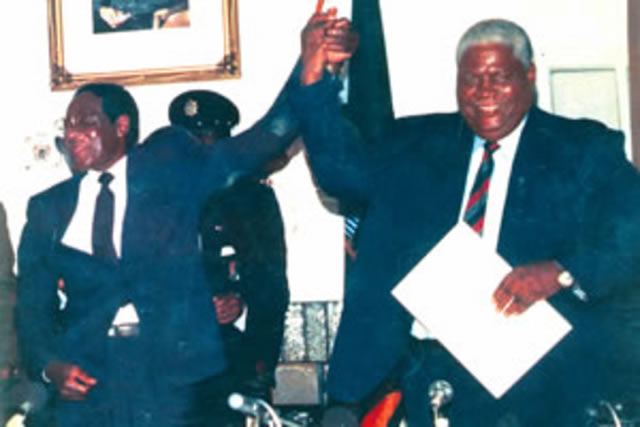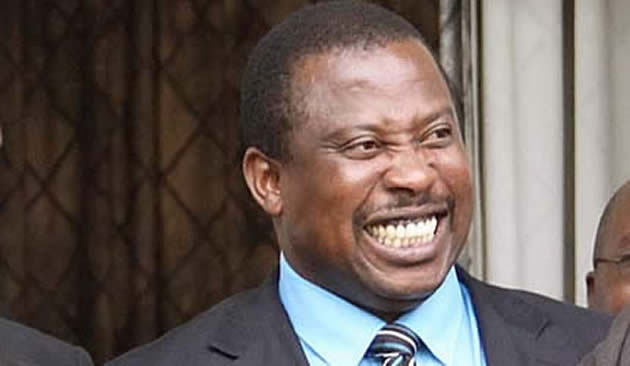Youths: Vanguard of national unity


President Mugabe and the late Vice President Joshua Nkomo secured a model realm for generations to come by ending years of political-ethnic attrition
Stanely Mushava
Zimbabwe witnesses the thematic proliferation of unity this time every year. Now in its 26th year, Unity Day remains one of the flagship national holidays, as a monumental landmark and buttress of the nation. The Unity Accord, by which the nation effaced regional frontiers, enters its second stretch having clocked its Silver Jubilee last year. The current respite provides us with an opportunity to introspect as to how far we have gone during the period elapsed.
There is one important aspect of national unity that has not been fully addressed, that is, the role of the youths as vanguard of national unity.
It will be useful to demonstrate that few members of this important and biggest demographic pre-date 1987, while those that do among the 16-35 age group would have been too young to understand the agreement at the time of its currency.
And they may have been too young, as well, to understand the horrors and the ugly side of the attrition that December 22, 1987 ended.
As time moves on and will soon endow these young people with leadership, it is important that these young people are oriented towards national unity and a historical repeat averted.
Some recent trends have been unflattering.
On the Internet and social media where the majority of youths spend their time — they are now called (netizens) — there has been a proliferation of weblogs, Facebook and WhatsApp groups like “Not all Zimbabweans are Shona” and “Ndebele vs Shona” that are clearly tribalistic and inflammatory.
The phenomenon is on the increase.
This is appalling.
One might casually downplay the importance of social media but it is expedient to consider that these do not necessarily create but offer a vent to prior-formed convictions.
While politicians agree on the importance of unity between themselves, unity among the youths is not accorded due reverence.
Youths have been deliberately polarised along political lines and sometimes used to malign and assault each other.
This impugns national unity.
When the same youths take their turn in national leadership, what guarantee is there that they will develop overnight commitment to unity as an indispensable for nation-building? Who will exorcise divisive tendencies inculcated over time by unprofitable political conflicts? The anatomy of Zimbabwean unity must not merely focus on the calendar span but two critical domains; that is, the reach and purpose of our unity. Purpose asks the question many are prone to overlook.
Before we preach “Unity, unity and more unity,” we must first ask the import of the same.
President Mugabe and the late Vice President Joshua Nkomo secured a model realm for generations to come by ending years of political-ethnic attrition.
Chinua Achebe decries a perception of unity as an absolute ideal in the absence of due attention to the purpose for which the unity is desired.
Says he: “Obviously, it is good for a group of people to unite to build a school or a hospital or a nation. But supposing a group of people get together to rob a bank? Their unity is deemed undesirable.
“Indeed, lawyers would call their kind of unity by the flattering name of conspiracy. Therefore we cannot extol the virtues of unity without first satisfying ourselves that the end to which the unity is desired is unimpeachable,” he argues.
So unity for national development, an automated, almost clichéd riposte, is fair enough as a starting point.
Black Umfolosi have immortalised unity as a master-key to serial ideals, chiefly peace, development and jobs.
Going by these ideals, we can safely agree that Zimbabwean unity is a laudable voyage in the right direction in so far as depth of field is concerned.
Youths desire the perpetuity of this unity because it speaks of better things than the violence, retrogression and poverty spawned by disunity.
However, while acknowledging credible advance made in this regard, it is fair to admit that unity has not fully unhinged the threshold wide enough for equal access to these ideals because it has been erroneously circumscribed to geography and ethnicity not every other aspect of Zimbabwe’s demography. Unity is not only cordial co-existence between regions. There is more to national unity than forfeiting frontiers imposed by colonialism.
Unity is supplanting every semblance of faction. It is time it became a priority among the youths. Youths make the next frontier of national cohesion.








Comments